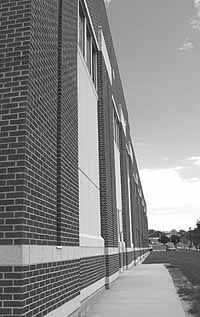| The new Reeves Building at CEU is one of many buildings an increased studentbody brought on by a scholarship endowment could utilize. |
The idea of creating an endowment for scholarships for College of Eastern Utah students from royalties the county collects each year on coal and gas will be discussed at the Carbon County Commission meeting on Nov. 19.
The concept, which has been batted around for some time, was recently addressed in a letter to commissioners from Brad King, a vice president at the college who is in charge of institutional development.
“Commissioner (Bill) Krompel came to me about a year ago and asked me to think about a way that the county could be involved with the college that would be helpful to the continued growth of the college and provide some economic stimulus to our local economy,” stated King in the document. “We talked about a number of possibilities, but his suggestion which intrigued me the most was the creation of a scholarship program for Carbon County residents supported by royalties from our extraction industries.”
Those funds presently come to the Recreation, Transportation Special Service District that was created by the county to administer the money. This agency had to be set up to accept the money because state law does not allow the funds to come directly to the county.
The amount of money that comes from royalties varies from year to year. The average over the past four or five years has been between $2.5 and $3 million, but this year the county may realize as much as $4.5 million.
Attached to the letter was a draft proposal for such a program which King referred to as a “two pronged approach which will encourage economic development in the short-term and an educational endowment in the long run.”
King also notes that part of the plan is to maximize the local purchasing for the college, so that money goes into the local community rather than other places.
The approach that King suggests is to use 40 percent of the money that comes in for scholarships and the other 60 percent would go into the endowment.
Of the 40 percent for scholarships, King suggests that it be used to generate money for existing scholarships so that it could be used for local students. This would free up money now used for local scholarships to entice students outside the area to come here.
The other “prong,” or the endowment would be built up over 10 years to reduce the amount of tuition any local student would have to pay to attend school at CEU. This would create (without any kind of special tax levy) an education fund that would benefit all residents of Carbon County who wanted an education.
As with all endowments, the bigger the fund the less those affected would have to pay. It is possible if things went well someday any Carbon resident who wanted to go to the college could do so tuition free.
According to King the economic impact, the other goal of such a system, would come from new students coming into the area and more money being spent on education, which increases the number of personnel that the college needs along with the purchases they would make from the community. It could also ultimately lead to a much better educated populace in the county which helps to attract industry.
At present a scholarship program in Uintah County is operating on a similar basis. Uintah’s mineral lease payments, which mostly come from oil, are going to fund students at both the technical center school in Vernal and the Utah State University extension program.
But while there are supporters of this in the county, there is also another side to doing this type of thing.
“I’m not in favor of this at all,” said Commissioner Mike Milovich on Monday afternoon. “We have a lot of critical needs in our community right now, and I think any money should go toward those.”
Milovich went on to explain that many of the departments in county government are also suffering due to the lack of funds.
“We can’t pay people the way we should and some of the equipment we need we can’t buy, yet some people are thinking we should put this money into this,” he states.
Proponents point out that the long term economic benefits more than outweigh any belt tightening in the short term.

